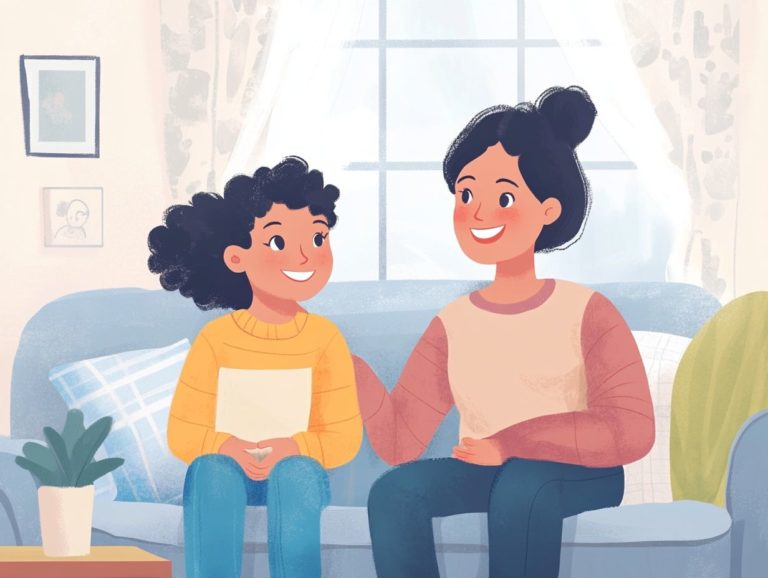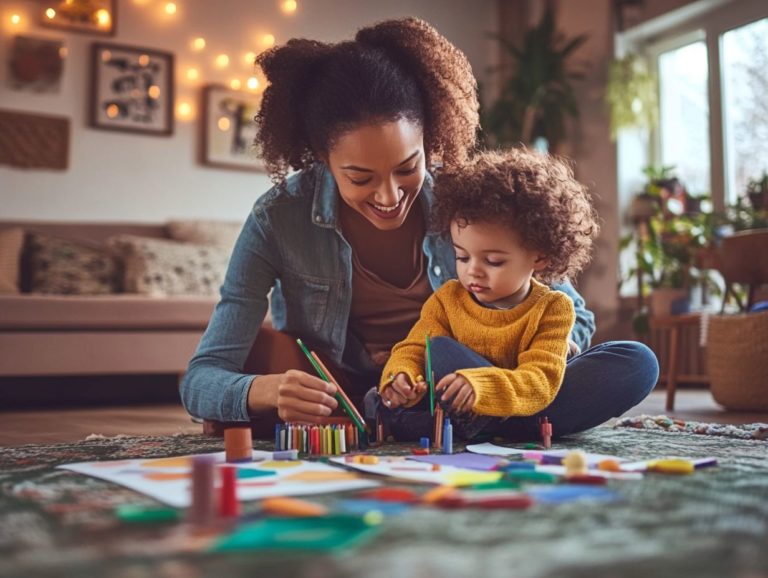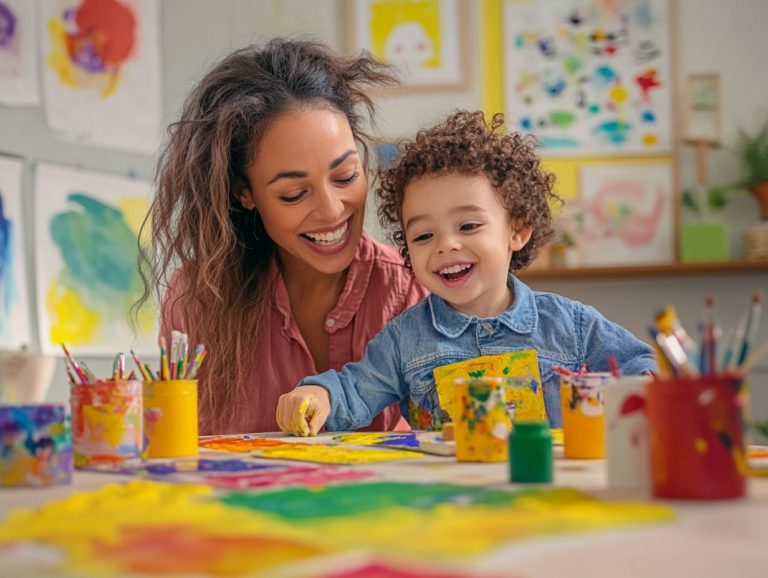5 Ways to Connect with Teens Effectively
Connecting with teenagers can often feel like navigating a complex maze of emotions and interests. As they transition into adulthood, establishing a meaningful relationship with them becomes essential for better communication and trust.
This article delves into five effective strategies to bridge that gap and improve your parenting experience:
- Actively listening and acknowledging their feelings to enhance understanding and empathy.
- Showing genuine interest in their passions and giving positive feedback.
- Leveraging social media for connection while respecting their independence.
- Practicing transparency and open communication.
- Setting healthy boundaries on social media, substance use, and driving.
It also highlights the significance of these connections, the common challenges faced, and the benefits of effective communication. Whether you re a parent or a teacher, get ready to empower yourself with these insights to foster stronger relationships with the teens in your life by understanding their behavior and emotional needs.
Contents
- 1. Listen, Acknowledge Their Feelings, and Communicate Effectively
- 2. Show Genuine Interest in Their Interests and Share Time Together
- 3. Use Social Media to Connect and Communicate
- 4. Be Transparent, Honest, and an Open Book
- 5. Set Boundaries, Stick to Them, and Foster Independence
- Why Is It Important to Connect with Teens and Be an Active Listener?
- What Are the Common Challenges in Connecting with Teens and Improving Communication?
- How Can Parents Connect with Their Teenagers and Build Trust?
- Frequently Asked Questions
- 5 Effective Ways to Connect with Teens
Key Takeaways:

- Acknowledge their feelings and truly listen for a stronger bond.
- Show genuine interest in their interests, hobbies, and passions to strengthen your bond and improve their self-esteem.
- Utilize social media to connect with teens, but also be aware of potential dangers and set boundaries to maintain control and respect their privacy.
1. Listen, Acknowledge Their Feelings, and Communicate Effectively
Listening to and acknowledging a teenager’s feelings is essential for fostering a strong, supportive relationship with your child. This creates an environment where open communication can flourish and emotional health is prioritized.
When your teenager feels heard and understood, it significantly boosts their self-esteem and encourages them to be more forthcoming with their emotions. This leads to deeper connections within the family.
You can achieve this by actively listening to your teen and respecting their viewpoints, which in turn fosters trust and empathy in your interactions. This approach lays the groundwork for healthier conversations and mutual understanding.
Active listening involves specific techniques that can greatly enhance this process. For example, maintaining consistent eye contact signals to your teenager that their feelings are valued. Using affirming body language like nodding or leaning slightly forward reinforces the message that their emotions truly matter.
These communication strategies can help improve your relationship. Empathy is critical in this dynamic; by acknowledging their feelings without judgment, you can effectively demonstrate understanding.
This acknowledgment not only helps your teenager feel valued but also promotes their emotional well-being. This ensures they develop the skills necessary to navigate their relationships with confidence and resilience.
Ultimately, these strategies create a nurturing atmosphere where teenagers can thrive emotionally and feel secure in expressing themselves, leading to positive experiences and improved self-esteem.
Demonstrating genuine interest in a teenager’s passions is an incredibly effective way to strengthen the bond between you and your teen. This fosters a supportive environment that nurtures their mental health and emotional well-being.
Sharing time together on their interests can build a strong connection. By actively engaging in shared activities or simply diving into conversations about their interests, you can create a safe space where your teenager feels valued and understood.
This involvement not only opens the door to exploring new hobbies together but also provides you with insight into your teen’s unique perspective on life. Encouraging your teenager to express their interests openly helps build trust.
Paving the way for more meaningful discussions, when you show enthusiasm for what excites your teen, it positively impacts your relationship. This makes it easier to navigate the challenging topics that often arise during these transformative years.
Don’t forget to praise their efforts and provide positive feedback.
3. Use Social Media to Connect and Communicate

Utilizing social media as a connection tool offers you unique opportunities to engage with your teenager, bridging generational gaps and enhancing communication by tapping into shared interests and experiences. Social media can be a great platform to understand their interests and behavior better.
Follow your teenager on Instagram, TikTok, or Twitter to gain valuable insights into what excites them from favorite music and current trends to hobbies and social circles. This knowledge forms a solid foundation for initiating genuine conversations, allowing you to ask thoughtful questions and share your opinions on the things that truly matter to them. Sharing your experiences on these platforms can also build a stronger bond.
Striking a balance is crucial to maintaining trust while respecting your teenager s privacy. By fostering open dialogues about social media usage, you create an environment of trust, enabling a supportive relationship where your teenager feels comfortable sharing their online experiences while still maintaining their personal space.
4. Be Transparent, Honest, and an Open Book
Being transparent and honest with teenagers is vital for building trust and respect in your relationship with them. This approach lays a solid foundation for open discussions about their emotions and the challenging situations they might encounter. Being an open book helps in sharing your emotional reactions and experiences.
When you model honesty, you create an environment where your teenager feels safe to share their thoughts and feelings without the fear of being judged. For example, if you openly discuss your own mistakes and the lessons learned from them, you encourage your teenager to acknowledge their struggles and seek your advice. This kind of transparency can lead to healthier emotional responses, enabling them to express sadness or anxiety during tough times instead of bottling it up.
Setting clear expectations and giving constructive feedback is also essential. Address difficult topics, like peer pressure or relationship issues, with openness. This demonstrates that vulnerability is a strength, fostering a deeper connection between you and your teenager, giving them the power to navigate their emotional landscapes more effectively.
5. Set Boundaries, Stick to Them, and Foster Independence
Establishing and maintaining clear boundaries is essential in parenting teenagers; it helps them become more independent while building a trusting relationship between you and your child. Clear boundaries help in managing their behavior and emotional reactions.
You can set boundaries in various aspects of your teenager’s life, including rules regarding academic performance, driving privileges, and substance use. For instance, by establishing guidelines for schoolwork, you encourage a strong work ethic, while rules about driving help ensure safety and responsibility on the road. Having open conversations about these rules can greatly enhance your communication strategies.
Open discussions about the implications of substance use can empower your teen to make informed decisions. It’s crucial for you to remain consistent in enforcing these boundaries, as unpredictability can lead to confusion.
By fostering an environment of open dialogue, you create a space where your teen feels comfortable discussing their feelings and choices, ultimately strengthening the bond between you both. Sharing meals and time together can also reinforce these boundaries and improve communication.
Why Is It Important to Connect with Teens and Be an Active Listener?

Connecting with teenagers is essential for their emotional health and overall well-being. It lays the groundwork for fostering strong relationships that promote healthy communication, self-esteem, and resilience in the face of life s challenges.
By building a meaningful bond with teens, you gain insight into their feelings and behaviors. This enables you to provide the right support and guidance they need to navigate the unique hurdles of adolescence, such as peer pressure and the impact of social media.
Developing a deeper connection allows you to help them with decision-making, build trust, and validate their emotions. This also helps in understanding their unique perspectives and experiences better.
These connections yield long-term benefits, including significantly improved mental health outcomes. Teens with supportive relationships often report lower rates of anxiety and depression.
When they know they can turn to you without fear of judgment, they re more likely to make informed decisions. This contributes to better academic performance and safer lifestyle choices. Praise their efforts and celebrate their achievements to build a stronger bond.
Engaging in regular family activities, like game nights or shared hobbies, not only strengthens your bond but also creates a platform for open dialogue. Simple gestures, such as actively listening or acknowledging their concerns, can empower your teens.
These actions equip them with the skills to resist peer pressure and cultivate healthy relationships. Sharing positive experiences regularly helps in building trust and understanding.
What Are the Common Challenges in Connecting with Teens and Improving Communication?
One of the primary challenges you face in connecting with teenagers is their emotional turbulence. This often makes it tough to truly grasp their feelings and communicate effectively during these crucial years.
This emotional whirlwind is intensified by generational differences that create significant gaps in understanding and perspective. The world your teenager navigates today is vastly different from the one you grew up in.
Communication barriers can also emerge, as you might find it difficult to relate to the intricate social dynamics and pressures your children encounter. This is especially true given the pervasive influence of social media.
To bridge this divide, embrace ways to listen actively, encourage open dialogues, and demonstrate genuine interest in your teenager’s life. These practices can cultivate a supportive environment and fortify your relationship.
Establishing regular check-ins also offers a valuable opportunity to discuss both challenges and achievements. This paves the way for deeper emotional connections to flourish.
How Can Parents Connect with Their Teenagers and Build Trust?
You can connect with your teenager by employing effective communication strategies and showing genuine support for their interests and emotions. This approach enhances mutual understanding and builds trust between you.
As a parent, it s important to validate their feelings and offer praise for their efforts to foster a positive relationship. To cultivate this important bond, schedule regular one-on-one time with your teen.
Create a safe space for open dialogue. Engage in shared activities whether it’s cooking together, playing sports, or enjoying a movie night.
Share meals and spend time together in ways that encourage natural conversations that flow effortlessly. These moments can break down barriers and build stronger connections.
Establishing an environment where feelings and experiences can be discussed openly allows your teenager to express themselves without fear of judgment. By being approachable and ready to listen, you can help your child navigate the complexities of adolescence.
This promotes a lifelong relationship founded on trust and respect. Remember, open communication strategies and active listening play key roles in this process.
What Are the Benefits of Effective Communication with Teens?

Effective communication with teenagers brings a wealth of benefits, including enhanced emotional well-being, stronger relationships, and boosted self-esteem as they feel validated and supported by you. It also helps in guiding their decisions, managing emotions, and building a supportive family environment.
When you maintain open lines of dialogue, misunderstandings and conflicts can be greatly reduced, creating a more harmonious home environment. As they learn to express their thoughts and feelings, teens are likely to become more independent, equipping themselves with essential skills to navigate life’s challenges. This better understanding fosters emotional resilience and a positive mental health outlook.
This nurturing atmosphere encourages them to seek your guidance instead of retreating into isolation during tough times. It fosters a sense of community and trust that ultimately contributes to their personal growth and resilience. By being an active listener and showing empathy, you validate their feelings and strengthen your bond.
How Can Teachers Connect with Their Teenage Students?
You can connect with your teenage students by employing empathetic communication techniques, creating an engaging learning environment, and demonstrating a genuine interest in their personal experiences. This approach cultivates a supportive atmosphere where education can thrive. Recognizing their unique challenges, including those related to school, will help build a better connection.
To deepen this connection, consider incorporating your students’ interests into your lessons. Tailoring content that resonates with their unique passions whether it’s sports, art, or technology makes learning more relevant and enjoyable for them. Providing them with feedback and opportunities for open dialogue will further engage them.
Establishing opportunities for open dialogue will encourage your students to express their thoughts and concerns without fear of judgment, fostering a more collaborative classroom dynamic. Recognizing the emotional challenges they face, both inside and outside of school, allows you to provide the support and understanding they need. Using empathetic body language and praising their efforts will validate their feelings and enhance their confidence.
When students feel heard and valued, their motivation to learn and participate increases significantly, resulting in a richer and more fulfilling educational experience. Building partnerships with students and recognizing their efforts foster a feeling of respect and approval, which enhances their overall educational experience.
What Are Some Strategies for Building Strong Relationships with Teens?
Building strong relationships with teenagers demands a strategic approach that prioritizes consistent communication, emotional support, and active engagement in their lives, all of which foster trust and connection. Developing empathy and understanding their behavior and emotional reactions are key components to this strategy.
To achieve this, it s essential to carve out dedicated time for meaningful conversations, where they can share their thoughts without distractions. Practicing active listening plays a pivotal role in this dynamic, as it demonstrates your understanding and encourages them to express themselves freely. Share time together in activities that resonate with their interests to enhance these conversations.
Creating a safe space for feedback gives them the power, allowing you to gain deeper insights into their feelings and experiences. This reciprocity not only strengthens your bond but also equips you with the understanding needed to guide fruitful discussions. Ultimately, this nurturing approach fosters a deeper emotional connection, ensuring that teenagers feel both valued and heard. This atmosphere encourages them to handle their emotions better and make informed decisions.
Frequently Asked Questions
5 Effective Ways to Connect with Teens
What are 5 ways to connect with teens effectively?
1. Listen to them. Actively listening shows you care about their thoughts and feelings. This builds a strong connection.
2. Find common ground. Discover shared interests or hobbies to break the ice. This makes it easier to bond over enjoyable activities.
3. Respect their boundaries. Respecting their space is vital and helps build trust. It allows them to feel comfortable sharing with you.
4. Be open and honest. Teens can tell when someone is being fake. Be yourself to encourage them to open up to you.
5. Show support and empathy. Teens face many challenges. Let them know you are there to help by listening and offering guidance.






